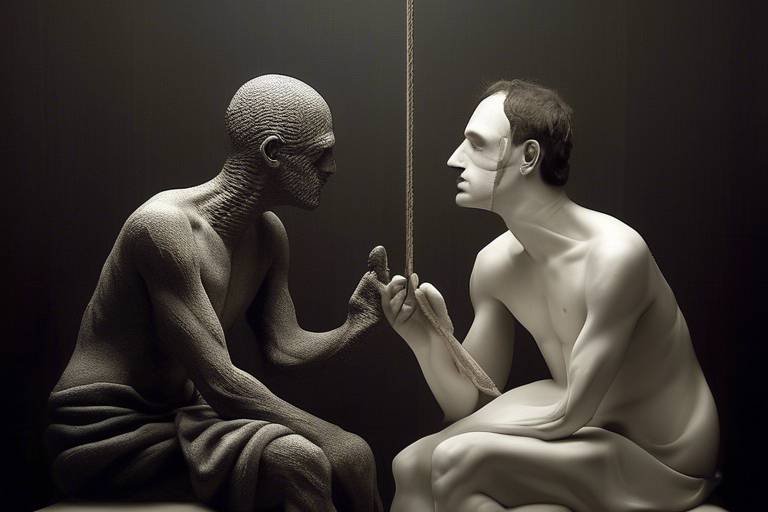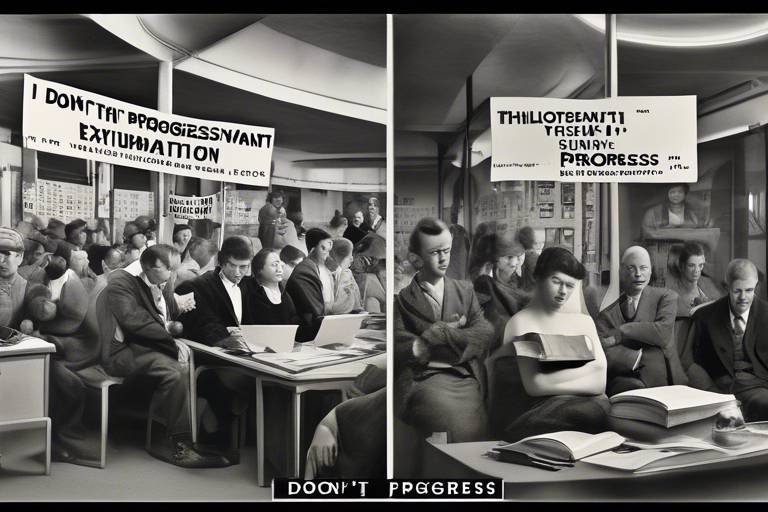Exploring Cynicism in the Modern Context
Cynicism, a term that often evokes images of jaded individuals with a skeptical outlook, has evolved significantly in today's fast-paced world. It’s not just a personal attitude but a complex social phenomenon that influences how we interact with each other and perceive the world around us. In an age where information is abundant yet often misleading, cynicism can seem like a natural response to the chaos and uncertainty that defines modern life. But what exactly drives this pervasive sentiment? Is it merely a defense mechanism against disappointment, or does it serve a deeper purpose in our society?
To truly grasp the essence of cynicism today, we must first recognize its historical roots. Originating from ancient philosophical schools, particularly the Cynics of Greece, this worldview was characterized by a rejection of societal norms and a pursuit of virtue through simplicity. Figures like Diogenes of Sinope epitomized this philosophy, advocating for a life lived in accordance with nature and often challenging the hypocrisy of contemporary society. Fast forward to today, and we find that while the *context* has changed, the core of cynicism remains—an innate skepticism towards authority, institutions, and even interpersonal relationships.
In the modern context, cynicism manifests in various forms, from biting sarcasm in social media posts to a more profound distrust of political leaders and corporations. It's as if we’ve collectively agreed that skepticism is a necessary armor against the disappointments of life. But is this cynicism merely a reflection of our reality, or does it also shape our perceptions and interactions? The line between healthy skepticism and debilitating cynicism is thin, and navigating this landscape is crucial for our mental well-being.
Interestingly, the rise of digital platforms has amplified cynical attitudes, with memes and viral content often mocking societal norms and expectations. This cultural shift raises an important question: Are we becoming more cynical as a society, or are we simply more vocal about the cynicism that has always existed? The answer may lie in how we choose to engage with these feelings. While cynicism can lead to isolation and despair, it can also spark critical discussions and inspire change. It’s a double-edged sword that requires careful handling.
As we explore the implications of cynicism in contemporary society, it becomes evident that it is not merely a negative trait but a complex emotional response that can lead to both insight and disillusionment. In the following sections, we will delve deeper into the origins of cynicism, its portrayal in popular culture, and its psychological impacts, all while examining the delicate balance between cynicism and realism. By understanding this multifaceted nature, we can better navigate our own perspectives and foster healthier relationships with ourselves and others.
- What is cynicism? Cynicism is a mindset characterized by skepticism and distrust towards societal norms, institutions, and human motives.
- How did cynicism originate? Cynicism originated from ancient Greek philosophy, particularly from the Cynics, who advocated for a life in accordance with nature and questioned social conventions.
- Is cynicism always negative? While cynicism can have negative effects, such as isolation, it can also foster critical thinking and resilience.
- What is the difference between cynicism and realism? Cynicism is often characterized by a negative outlook and distrust, while realism involves a practical approach to situations without excessive skepticism.

The Origins of Cynicism
Cynicism, a term that often evokes images of jaded individuals who view the world through a lens of skepticism, has a rich and complex history that dates back to ancient philosophical traditions. Its roots can be traced to the Cynics of ancient Greece, particularly the teachings of Diogenes of Sinope, who is perhaps the most famous figure associated with this philosophical school. Diogenes and his followers challenged the social norms of their time, advocating for a life lived in accordance with nature and in rejection of societal conventions. They believed that true happiness could only be achieved by living a life of virtue, free from the distractions of material possessions and societal expectations.
The term "cynicism" itself is derived from the Greek word kynikos, meaning "dog-like," which reflects the Cynics' disdain for the pretentiousness of society. Diogenes famously lived in a large ceramic jar and was known for his provocative behavior, such as wandering around Athens with a lantern in broad daylight, claiming to be searching for an honest man. This radical approach to life and philosophy laid the groundwork for what we now understand as cynicism—a questioning attitude towards accepted norms and a belief that people are motivated primarily by self-interest.
As cynicism evolved over the centuries, its interpretation shifted. In the Middle Ages, it was often associated with moral degradation and a lack of faith, while during the Enlightenment, it began to be viewed as a form of skepticism that was necessary for intellectual discourse. Philosophers like Friedrich Nietzsche and Arthur Schopenhauer further explored the darker aspects of human nature, emphasizing the importance of questioning established truths and societal norms. This philosophical lineage has profoundly influenced modern thought, leading to the contemporary understanding of cynicism as both a critical lens through which to view society and a potential barrier to genuine connection.
Today, cynicism manifests in various ways across different cultures and contexts. It can be seen in the pervasive distrust of institutions, the skepticism towards political figures, and the general disillusionment with societal progress. In a world where information is abundant yet often misleading, the cynical viewpoint can serve as a protective mechanism against manipulation and deceit. However, this same skepticism can also lead to a sense of hopelessness and isolation, as individuals may find it challenging to trust others or engage meaningfully with the world around them.
In summary, the origins of cynicism are deeply rooted in philosophical inquiry and the human experience. Understanding its historical context not only sheds light on its evolution but also highlights the dual nature of cynicism as both a critical tool for examining society and a potential source of personal and social disconnection. By exploring these origins, we can better appreciate the complexities of cynicism in our modern lives.
- What is the main philosophy behind cynicism? Cynicism advocates for living in accordance with nature and virtue, often rejecting societal norms and materialism.
- Who was Diogenes of Sinope? Diogenes was an ancient Greek philosopher known for his ascetic lifestyle and for being a prominent figure in the Cynic movement.
- How has the perception of cynicism changed over time? Cynicism has evolved from being viewed as a moral failing to a necessary skepticism that encourages critical thinking and questioning of societal norms.

Cynicism in Popular Culture
Cynicism is not just a philosophical stance; it has woven itself into the very fabric of our popular culture, manifesting in literature, film, music, and even art. It's fascinating to see how this skeptical worldview resonates with audiences, often reflecting the complexities of modern life. From sarcastic protagonists in novels to biting satire in films, cynicism serves as a lens through which we can examine societal flaws and human nature. It’s almost like a mirror, reflecting our deepest fears and frustrations, while simultaneously inviting us to laugh at the absurdity of it all.
Take a moment to think about your favorite TV shows or movies. How many of them feature a cynical character? You know, the one who rolls their eyes at the idealism of others, the one who always seems to have a snarky comeback ready. These characters often become fan favorites, perhaps because they voice what many of us are secretly thinking. They challenge the status quo, pushing against the grain of societal norms. This portrayal of cynicism can be both entertaining and enlightening, allowing viewers to engage with uncomfortable truths about the world.
Literature has long been a playground for cynics. Take, for instance, the works of authors like George Orwell or Kurt Vonnegut. Their narratives often delve into the darker aspects of human behavior and societal structures, inviting readers to question the integrity of institutions and the motives of those in power. Characters like Orwell's Winston Smith in "1984" or Vonnegut's Kilgore Trout embody a sense of disillusionment that resonates deeply with readers. These literary figures serve as a reminder that cynicism can be a powerful tool for social critique, forcing us to confront uncomfortable realities.
When we turn to film and television, the portrayal of cynicism becomes even more pronounced. Movies like "Fight Club" and "The Big Lebowski" showcase protagonists who navigate a world filled with disillusionment and absurdity. These films often highlight the futility of consumerism and the emptiness of modern life, presenting cynicism as a response to a society that seems increasingly disconnected from genuine human experience. Television shows like "The Office" and "Parks and Recreation" also feature cynical characters who provide comedic relief while simultaneously critiquing workplace culture and societal expectations.
Music, too, serves as a potent medium for expressing cynicism. Genres like punk rock and hip-hop often convey disillusionment and critique societal values through raw lyrics and themes. Artists like Bob Dylan and Nirvana have used their platforms to voice skepticism about authority, love, and the American Dream. Their songs resonate with listeners who feel marginalized or disenchanted, creating a sense of community among those who share similar frustrations. The power of music lies in its ability to articulate feelings that many of us struggle to express, making cynicism not just a personal sentiment, but a collective experience.
As we navigate through these various forms of media, it becomes clear that cynicism is not merely a negative trait, but a complex response to the world around us. It can be both a shield against disappointment and a catalyst for change. By examining how cynicism is portrayed in popular culture, we gain valuable insights into our own beliefs and attitudes, ultimately prompting us to reflect on our place in an ever-evolving society.
- What is cynicism? Cynicism is a mindset characterized by skepticism and distrust towards people's motives and societal norms.
- How does cynicism manifest in popular culture? It appears in literature, film, music, and art, often through cynical characters or themes that critique society.
- Are there any positive aspects of cynicism? Yes, cynicism can foster critical thinking and resilience, helping individuals navigate challenging situations.
- Can excessive cynicism be harmful? Absolutely, it can lead to disillusionment, isolation, and a breakdown of social connections.

Literature and Cynicism
Literature has long served as a mirror reflecting the complexities of human nature, and within this realm, cynicism often emerges as a prominent theme. From the biting satire of classical authors to the contemporary narratives that question societal norms, literary works frequently explore the darker corners of human experience. Think about it: how many novels have you read where the protagonist is a jaded anti-hero, disillusioned by the world around them? This portrayal is not just a coincidence; it’s a profound commentary on the disconnection many feel in a rapidly changing society.
Notable examples of cynicism in literature can be found in works such as Catch-22 by Joseph Heller, where the absurdity of war and bureaucracy is laid bare through a cynical lens. The protagonist, Yossarian, embodies a deep skepticism towards authority and the systems that govern life, reflecting a broader disillusionment that resonates with readers. Similarly, in The Catcher in the Rye by J.D. Salinger, Holden Caulfield's cynical view of the world highlights his struggle against the perceived phoniness of society, making readers question the authenticity of their own interactions.
But why does literature so often gravitate towards cynicism? One reason is that it allows authors to delve into the moral dilemmas and contradictions of life. By crafting cynical characters, writers can challenge readers to confront uncomfortable truths about society, relationships, and themselves. This literary device not only entertains but also provokes thought, encouraging us to reevaluate our own beliefs and the world around us.
Moreover, the exploration of cynicism in literature can take various forms, such as:
- Characterization: Cynical characters often serve as a critique of societal norms, revealing the flaws and hypocrisies present in everyday life.
- Thematic Elements: Themes of disillusionment and skepticism permeate narratives, prompting readers to reflect on their own experiences.
- Satire and Irony: Many authors employ satire to expose the absurdities of human behavior, using humor to underscore serious critiques.
In essence, literature acts as a conduit for exploring cynicism, allowing both authors and readers to engage in a dialogue about the complexities of human existence. This engagement not only enriches our understanding of literature but also offers a lens through which we can examine our own lives and the societal structures we navigate daily.
As we continue to navigate an increasingly complex world, the cynical perspectives presented in literature remind us that questioning the status quo is not only valid but necessary. They invite us to reflect on our values and beliefs, challenging us to find meaning amidst the chaos. Ultimately, literature’s portrayal of cynicism serves as both a warning and a call to action, urging us to remain vigilant and critical in our perceptions of reality.

Film and Television Representations
When we think about film and television, it's impossible to overlook how these mediums have become a mirror reflecting society's collective psyche, especially when it comes to cynicism. From the gritty narratives of film noir to the sharp wit of modern sitcoms, cynicism serves as a powerful lens through which characters navigate their often tumultuous worlds. It's as if the silver screen has become a stage where cynicism plays the lead role, influencing not just the characters but also the audience's perception of reality.
Take, for instance, the iconic character of Holly Golightly from Truman Capote's novel, later adapted into the beloved film "Breakfast at Tiffany's." Holly embodies a certain cynicism about love and relationships, portraying a sense of detachment that resonates deeply with viewers. Her playful yet jaded demeanor invites the audience to question the authenticity of romantic ideals. This blend of charm and skepticism creates a captivating character that challenges our perceptions of happiness and fulfillment.
In television, series like "The Office" and "Parks and Recreation" utilize humor to explore cynical attitudes toward work and relationships. Characters like Jim Halpert and Leslie Knope navigate their environments with a mixture of hope and sarcasm, making us laugh while simultaneously prompting us to reflect on our own experiences. This juxtaposition of cynicism and optimism allows viewers to connect on a personal level, as they see their own struggles mirrored in these fictional lives.
Moreover, the rise of anti-heroes in contemporary television has further solidified cynicism as a dominant theme. Characters such as Walter White from "Breaking Bad" and Tony Soprano from "The Sopranos" exemplify how cynicism can drive narratives that challenge traditional notions of morality. Their complex, often morally ambiguous choices force audiences to grapple with difficult questions about right and wrong, leaving them to ponder the gray areas of human nature.
To illustrate how pervasive cynicism is in film and television, consider the following table that highlights some notable films and series along with their cynical themes:
| Title | Medium | Cynical Theme |
|---|---|---|
| Fight Club | Film | Consumerism and Identity |
| Mad Men | Television | Disillusionment with the American Dream |
| The Big Lebowski | Film | Absurdity of Life |
| Fargo | Television | Moral Ambiguity |
These examples not only showcase the cynical outlook prevalent in popular culture but also highlight how these narratives resonate with audiences, often reflecting their own feelings of disillusionment and skepticism. The characters we watch on screen become representatives of our own struggles, prompting us to question societal norms and our place within them.
Ultimately, the representations of cynicism in film and television serve a dual purpose: they entertain us while simultaneously challenging our perspectives. Whether through humor, drama, or suspense, these narratives invite us to reflect on the complexities of human nature and the world we inhabit. In an age where trust seems to be in short supply, the cynical portrayals we see on screen often resonate more than ever, allowing us to confront our own feelings of doubt and uncertainty.
- What is cynicism in film and television? Cynicism in film and television refers to a skeptical outlook on life, often portrayed through characters who question societal norms and values.
- How does cynicism affect audience perception? Cynicism can shape audience perceptions by challenging traditional narratives and encouraging viewers to think critically about the realities presented on screen.
- Are there benefits to cynical representations? Yes, cynical representations can foster critical thinking and provoke discussions about morality and societal issues, making audiences more reflective about their own lives.

Cynicism in Music
Music has always been a powerful medium for expressing the complexities of human emotion, and cynicism is no exception. From the biting lyrics of punk rock to the reflective verses of folk, cynicism finds its way into the hearts of listeners, often resonating with their own feelings of disillusionment. This artistic expression acts as a mirror, reflecting societal issues and individual struggles, and it’s fascinating how different genres tackle this theme. For instance, while punk often screams rebellion against societal norms, folk music may offer a more introspective take on personal disillusionment.
One of the most striking aspects of cynicism in music is its ability to articulate the frustrations of a generation. Consider the lyrics of iconic bands and artists who have woven cynical narratives into their songs. They highlight the absurdities of life, the hypocrisy of institutions, and the often harsh realities of existence. Take, for example, Bob Dylan's "The Times They Are A-Changin'", which, while an anthem of hope, also carries a cynical undertone about the inevitability of change and the resistance it faces. Similarly, the raw energy of bands like The Sex Pistols captures a sense of anger and betrayal, resonating with listeners who feel let down by society.
Moreover, the cynicism expressed in music often serves as a critique of societal values. Artists like Nirvana and Radiohead delve into themes of alienation and existential dread, questioning the very fabric of modern life. Their lyrics can be both haunting and relatable, echoing the sentiments of many who grapple with the pressures of conformity and consumerism. This connection between artist and audience creates a powerful bond, as listeners find solace in the shared experience of skepticism.
Let's break down the ways cynicism manifests across various musical genres:
| Genre | Examples of Cynicism | Key Themes |
|---|---|---|
| Punk Rock | The Sex Pistols, Dead Kennedys | Rebellion, anti-establishment |
| Folk | Bob Dylan, Joan Baez | Disillusionment, social critique |
| Grunge | Nirvana, Soundgarden | Alienation, existential angst |
| Alternative Rock | Radiohead, The Smashing Pumpkins | Consumerism, emotional turmoil |
In conclusion, cynicism in music is not merely a negative outlook; it serves as a vital commentary on the human experience. It encourages listeners to confront uncomfortable truths and challenges them to think critically about the world around them. As we continue to navigate a complex and often chaotic society, music remains a sanctuary where cynicism can be expressed, understood, and perhaps even embraced.
- What is cynicism in music? Cynicism in music refers to the expression of skepticism and disillusionment about societal norms and values, often conveyed through lyrics and themes.
- Which genres of music are most associated with cynicism? Punk rock, folk, grunge, and alternative rock are among the genres that frequently explore cynical themes.
- Can cynicism in music have a positive impact? Yes, it can foster critical thinking and provide a sense of community for listeners who share similar feelings of disillusionment.

The Psychological Impact of Cynicism
Cynicism can be a double-edged sword, slicing through the fabric of our mental landscape. On one hand, it can serve as a protective shield, guarding us against disappointment and heartbreak. But on the other hand, it can also create a dark cloud that looms over our relationships and mental well-being. So, what exactly happens when we let cynicism seep into our thoughts and actions? The psychological impact of cynicism is profound, influencing not just how we see the world, but also how we interact with it.
At its core, cynicism fosters a sense of distrust and skepticism. When we adopt a cynical outlook, we begin to view others through a lens of suspicion. This can lead to a cycle of negativity, where we expect the worst from people and situations. For instance, if you've ever been let down by a friend, you might find yourself thinking, "They always disappoint me," which only reinforces the idea that trust is futile. This mindset can create a barrier to forming genuine connections, as we might push others away with our defensive attitudes.
Moreover, the psychological toll of cynicism can manifest in various ways. Studies have shown that individuals with a cynical outlook may experience higher levels of anxiety and depression. This is because constantly expecting negativity can lead to a state of chronic stress, making it difficult to find joy in everyday experiences. In fact, a recent study indicated that people who identified as cynical reported feeling less satisfied with their lives overall.
To illustrate this further, let's take a look at a table that summarizes some common psychological effects associated with cynicism:
| Psychological Effect | Description |
|---|---|
| Increased Anxiety | Cynics often feel on edge, anticipating betrayal or disappointment. |
| Depression | A persistent negative outlook can lead to feelings of hopelessness. |
| Isolation | Cynicism can push people away, resulting in loneliness. |
| Low Self-Esteem | Constantly doubting others can lead to self-doubt and insecurity. |
In relationships, cynicism can create a vicious cycle. When we expect others to act in self-serving ways, we might respond defensively, which can lead to misunderstandings and conflicts. Think about it: if you approach a conversation with the belief that the other person is out for their own gain, how open will you be to hearing their side of the story? This can lead to a breakdown in communication and trust, further entrenching the cynic's worldview.
Interestingly, while cynicism can be detrimental, it can also serve as a catalyst for personal growth. By recognizing our cynical tendencies, we can challenge them and work towards a more balanced perspective. For example, instead of assuming the worst in people, we can practice seeing the good in them, which can lead to healthier relationships and improved mental health. This transformation requires conscious effort but can be incredibly rewarding.
In conclusion, the psychological impact of cynicism is significant and multifaceted. While it can offer a sense of protection, it often comes at the cost of our happiness and relationships. By understanding the effects of cynicism, we can begin to navigate our thoughts and behaviors in a way that fosters connection rather than isolation. Remember, it's not just about guarding ourselves from disappointment; it's also about opening ourselves up to the beauty of human connection and the potential for joy in our lives.
- What is cynicism? Cynicism is an attitude characterized by a general distrust of others' motives, often leading to skepticism and negativity.
- How does cynicism affect relationships? Cynicism can create barriers to trust and open communication, making it difficult to form genuine connections with others.
- Can cynicism be beneficial? While often seen as negative, cynicism can foster critical thinking and help individuals protect themselves from disappointment.
- How can I overcome cynicism? Acknowledging cynical thoughts and actively working to challenge them can help shift your perspective towards a more positive outlook.

Cynicism vs. Realism
Understanding the distinction between cynicism and realism is crucial for navigating the complexities of modern life. While both perspectives can shape our views and decisions, they stem from different places and lead to varying outcomes. Cynicism often emerges from a place of distrust and skepticism, suggesting that people are primarily motivated by self-interest. In contrast, realism is rooted in a pragmatic understanding of the world, allowing individuals to see things as they are without the emotional baggage that cynicism often carries.
To illustrate this difference, consider the following table that highlights key distinctions between cynicism and realism:
| Aspect | Cynicism | Realism |
|---|---|---|
| Definition | A belief that people are motivated purely by self-interest. | A practical approach to understanding the world as it is. |
| Emotional Tone | Often negative, leading to distrust and disappointment. | Neutral, focusing on acceptance and understanding. |
| Impact on Decision-Making | Can lead to paralysis by analysis or inaction. | Encourages informed and pragmatic choices. |
| Social Interactions | May foster isolation and a lack of meaningful connections. | Promotes openness and constructive relationships. |
When we dive deeper into the implications of these two perspectives, it becomes clear that while cynicism offers a shield against disappointment, it can also create a barrier to genuine connection. Have you ever noticed how a cynical outlook can cloud your judgment? It’s as if wearing dark glasses that distort the vibrant colors of life. In contrast, realism allows for a more balanced view, acknowledging the imperfections of humanity while still fostering hope and collaboration. It’s like seeing the world through clear lenses, revealing both the beauty and the flaws without losing sight of either.
Moreover, the overlap between cynicism and realism can sometimes lead to a confusing blend of attitudes. For instance, a realist might adopt a cynical view in response to a series of disappointments, mistaking their pragmatic assessment for a cynical dismissal of human nature. This is where the lines blur, and it’s essential to recognize when we’re slipping into cynicism rather than maintaining a realistic perspective. It’s all about awareness and intentionality in our thinking.
In conclusion, while cynicism can serve as a protective mechanism, it’s vital to strive for a more realistic outlook that embraces the complexities of life without succumbing to despair. By doing so, we can foster a more positive and constructive approach to our relationships and experiences. So, the next time you find yourself leaning towards cynicism, ask yourself: Is this perspective serving me, or is it holding me back?
- What is the main difference between cynicism and realism? Cynicism is characterized by distrust and skepticism about human motives, while realism focuses on a pragmatic understanding of the world without emotional bias.
- Can cynicism ever be beneficial? Yes, a moderate level of cynicism can foster critical thinking and protect against disappointment, but excessive cynicism can lead to isolation and negativity.
- How can I shift from a cynical to a realistic perspective? Practice mindfulness and self-awareness, challenge your negative assumptions, and seek to understand situations from multiple viewpoints.

Benefits of a Cynical Outlook
Cynicism often gets a bad rap, but it's essential to recognize that a cynical outlook can actually serve as a protective shield in a world full of uncertainties. Imagine walking through a bustling market where everyone is trying to sell you something. Wouldn't it be wise to approach with a hint of skepticism? This is where cynicism shines! It encourages us to question motivations and seek out hidden agendas. In a society where trust is often misplaced, a little cynicism can be a powerful tool.
One of the most significant benefits of cynicism is its ability to foster critical thinking. When we adopt a cynical perspective, we learn to analyze information more carefully. Instead of taking everything at face value, we dig deeper, asking ourselves whether the claims being made are genuine or merely a façade. This critical lens enables us to make more informed decisions in our personal and professional lives. For instance, in the age of social media, where misinformation spreads like wildfire, a cynical approach can help us navigate through the noise and find the truth.
Moreover, cynicism can cultivate resilience. Life is full of challenges and disappointments, and a cynical viewpoint can prepare us for the inevitable letdowns. By acknowledging that not everything will go our way, we build a mental buffer against disappointment. This doesn't mean we become pessimistic; instead, we learn to manage our expectations and remain grounded. Think of it like wearing a helmet while biking—cynicism is that helmet, protecting us from the bumps and falls we might face along the way.
Additionally, a cynical outlook can enhance our social awareness. When we question societal norms and values, we become more attuned to the issues that affect our communities. For example, many social movements have been born from a cynical critique of the status quo. By recognizing the flaws in existing systems, we can advocate for change and improvement. Cynics often become the catalysts for progress, pushing boundaries and challenging injustices.
However, it's crucial to strike a balance. While cynicism can be beneficial, it should not become a default setting. A healthy dose of skepticism can empower us, but too much can lead to a jaded perspective. The key is to harness the positive aspects of cynicism while remaining open to optimism and hope. It’s about finding that sweet spot where we can question the world around us without losing faith in humanity.
In summary, embracing a cynical outlook can lead to a more discerning, resilient, and socially conscious individual. Just like a double-edged sword, it has the potential to protect and empower us, but it requires careful handling. So, the next time you find yourself questioning the motives behind a shiny advertisement or a social media post, remember that your cynicism might just be your best ally in navigating the complexities of modern life.
- What is cynicism? Cynicism is an attitude characterized by skepticism and distrust toward others' motives and the sincerity of their actions.
- Can cynicism be positive? Yes, when balanced, cynicism can promote critical thinking, resilience, and social awareness.
- How can I manage excessive cynicism? It’s essential to cultivate optimism and remain open to positive experiences while maintaining a healthy skepticism.
- Is cynicism the same as pessimism? No, cynicism is focused on questioning motives, while pessimism is a general outlook of negativity about the future.

The Dangers of Excessive Cynicism
While a pinch of cynicism can be a useful seasoning in our approach to life, too much of it can spoil the dish. Excessive cynicism can lead to a state of disillusionment that not only affects how we perceive the world but also how we interact with it. Imagine walking around with a pair of tinted glasses that cast everything in a negative light; that’s what an overly cynical mindset can feel like. It can create a barrier between us and the joy of genuine connections, leaving us feeling isolated and misunderstood.
One of the most significant dangers of excessive cynicism is its ability to breed isolation. When we adopt a cynical worldview, we often push people away, convinced that no one can be trusted or that everyone has ulterior motives. This perspective can make it challenging to form meaningful relationships, as it fosters a sense of detachment. Over time, this detachment can morph into loneliness, leaving us yearning for connection but too guarded to reach out.
Moreover, excessive cynicism can distort our perceptions of reality. When we constantly expect the worst from people and situations, we may miss out on opportunities for positivity and growth. This negative lens can lead to a self-fulfilling prophecy, where our expectations shape our experiences. For instance, if we approach a new job or relationship with a cynical attitude, we might overlook the potential for success or happiness simply because we’re too focused on what could go wrong.
Additionally, the psychological toll of cynicism can be profound. Studies have shown that individuals with a cynical outlook may experience higher levels of stress and anxiety. This is largely because cynicism often involves a constant state of vigilance, where we feel the need to guard ourselves against perceived threats. This chronic state of alertness can lead to burnout, making it even harder to engage with the world positively.
It’s essential to recognize that while skepticism can be a protective mechanism, it can also hinder our ability to trust and connect. Here are a few potential pitfalls of excessive cynicism:
- Loss of Trust: A cynical mindset can erode trust in others, making it difficult to build or maintain relationships.
- Negative Outlook: Constantly expecting the worst can lead to chronic dissatisfaction and unhappiness.
- Impaired Decision-Making: A cynical perspective may cloud judgment, leading to missed opportunities and poor choices.
In conclusion, while a healthy dose of cynicism can serve as a protective shield against disappointment, excessive cynicism can create a fortress that isolates us from the world. It’s crucial to find a balance, allowing ourselves to be skeptical without losing the ability to connect, trust, and find joy in our experiences. By recognizing the dangers of excessive cynicism, we can work towards a more nuanced perspective that embraces realism without succumbing to despair.
1. Can cynicism ever be beneficial?
Yes, a moderate level of cynicism can foster critical thinking and protect against disappointment by encouraging skepticism about people's intentions and societal norms.
2. How can I combat excessive cynicism?
Engaging in positive experiences, practicing gratitude, and surrounding yourself with optimistic individuals can help counteract cynical thoughts and attitudes.
3. Is there a difference between cynicism and realism?
Yes, cynicism often involves a negative bias and distrust, while realism is about acknowledging the truth of situations without the emotional weight of pessimism.
4. How does cynicism affect relationships?
Excessive cynicism can lead to distrust and emotional distance, making it challenging to form and maintain healthy relationships.
Frequently Asked Questions
- What is cynicism?
Cynicism is a mindset characterized by skepticism and distrust towards the motives of others. It often involves a belief that people are primarily driven by self-interest, which can lead to a negative outlook on life and relationships.
- How did cynicism originate?
The roots of cynicism trace back to ancient Greek philosophy, particularly the Cynics, who advocated for a life in accordance with nature and questioned societal norms. Their ideas laid the groundwork for modern interpretations of skepticism and critical thinking.
- How does cynicism manifest in popular culture?
Cynicism is prevalent in various forms of media, including literature, film, and music. These mediums often portray cynical characters and themes, reflecting societal disillusionment and shaping public perceptions about trust and relationships.
- What are some examples of cynicism in literature?
Literary works often feature cynical characters who challenge societal values. Notable examples include works by authors like Franz Kafka and George Orwell, where characters navigate a world filled with moral ambiguity and distrust.
- Can cynicism have positive effects?
Yes, while cynicism is often viewed negatively, it can foster critical thinking and resilience. A cynical outlook can help individuals navigate challenging situations by encouraging skepticism towards unrealistic expectations and fostering a more grounded perspective.
- What are the dangers of excessive cynicism?
Excessive cynicism can lead to feelings of disillusionment and isolation. It may hinder the ability to form meaningful connections with others, as a persistent distrust can erode relationships and social bonds.
- How does cynicism differ from realism?
Cynicism often involves a negative interpretation of human motives, while realism focuses on a practical understanding of situations without the inherent distrust. Recognizing this difference is crucial for making informed decisions and maintaining healthy relationships.
- Is there a way to combat excessive cynicism?
Yes! Engaging in positive social interactions, practicing gratitude, and challenging negative thoughts can help combat excessive cynicism. Finding a balance between skepticism and optimism is key to fostering healthier perspectives.



















